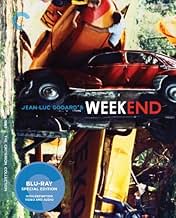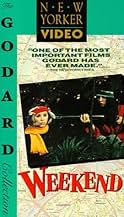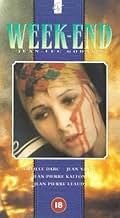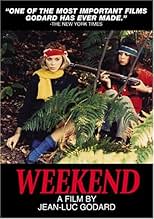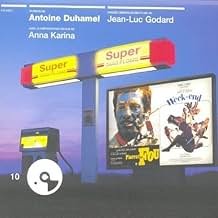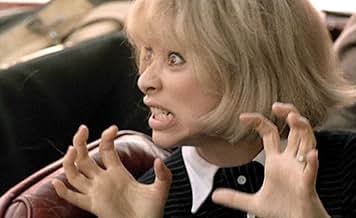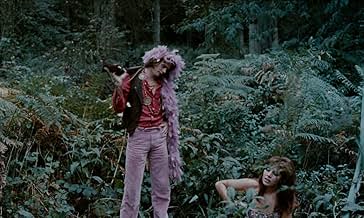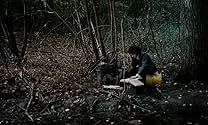IMDb-BEWERTUNG
6,9/10
16.403
IHRE BEWERTUNG
Die surreale Geschichte eines verheirateten Paares, das mit dem Auto zu den Eltern der Ehefrau fährt, um diese wegen des Erbes zu töten.Die surreale Geschichte eines verheirateten Paares, das mit dem Auto zu den Eltern der Ehefrau fährt, um diese wegen des Erbes zu töten.Die surreale Geschichte eines verheirateten Paares, das mit dem Auto zu den Eltern der Ehefrau fährt, um diese wegen des Erbes zu töten.
- Regie
- Drehbuch
- Hauptbesetzung
- Auszeichnungen
- 1 Gewinn & 4 Nominierungen insgesamt
Yves Afonso
- Gros Poucet
- (Nicht genannt)
Yves Beneyton
- Un membre du FLSO
- (Nicht genannt)
Juliet Berto
- Une activiste du FLSO
- (Nicht genannt)
- …
Michèle Breton
- Girl in the woods
- (Nicht genannt)
Michel Cournot
- Man From Farmyard
- (Nicht genannt)
Lex De Bruijn
- Revolutionary
- (Nicht genannt)
Jean Eustache
- L'auto-stoppeur
- (Nicht genannt)
Jean-Claude Guilbert
- Le clochard
- (Nicht genannt)
Paul Gégauff
- Le pianiste
- (Nicht genannt)
Blandine Jeanson
- Emily Bronte
- (Nicht genannt)
Louis Jojot
- Monsieur Jojot
- (Nicht genannt)
Valérie Lagrange
- La femme du chef du FLSO
- (Nicht genannt)
Jean-Pierre Léaud
- Saint-Just
- (Nicht genannt)
- …
Ernest Menzer
- Ernest - le cuisinier
- (Nicht genannt)
- …
Sanvi Panou
- Mon frère africain
- (Nicht genannt)
Empfohlene Bewertungen
10miloc
I gave this movie a 10 out of 10. I expect many people would feel hard-pressed to give it a 2 on the same scale, and I honestly wouldn't blame those who do. "Week End" is a machine built to provoke, and perhaps irritation as well as admiration can be a measure of such a machine's success.
For myself, I love it. It boils with anger, frustration, and insane energy. In one sense, it approaches film like the Cubists approached painting, breaking down images, ideas, characters and plot into startlingly photographed, almost geometric segments. But where the Cubists were to content to experiment with form Godard's instincts stay furiously political; it's as though an early Picasso had been commandeered and refitted by George Grosz.
Arrogance is not always a drawback, as rock and roll fans know-- and "Week End" is a terribly arrogant film. The director trashes every convention that he can think of. It's all thrown together-- music, dialogue, on-screen text, unvarnished political theory, frightening violence-- onto a bare hook of a plot: a young, apparently soulless couple go on a week-end trip in the middle of what appears to be the end of Western civilization. Without apologies Godard throws this mess on the table and asks the rest of us, "What have you got to match it?"
Sadly, not much. Cinema as an art has regressed rather than advanced since this film was released. (Godard himself stalled after "Week End.") Despite the rise of independently funded, non-Hollywood films in the past decade, no one seems ready to dare the sort of experimentation with what film could be that was begun in the 60s, and this is a sad thing. The films made by Godard at the height of his powers are all the more precious now. "Week End" is a document of a time when film mattered. It is an artifact, but it would only be dated if it had been surpassed. It does not rest in peace.
For myself, I love it. It boils with anger, frustration, and insane energy. In one sense, it approaches film like the Cubists approached painting, breaking down images, ideas, characters and plot into startlingly photographed, almost geometric segments. But where the Cubists were to content to experiment with form Godard's instincts stay furiously political; it's as though an early Picasso had been commandeered and refitted by George Grosz.
Arrogance is not always a drawback, as rock and roll fans know-- and "Week End" is a terribly arrogant film. The director trashes every convention that he can think of. It's all thrown together-- music, dialogue, on-screen text, unvarnished political theory, frightening violence-- onto a bare hook of a plot: a young, apparently soulless couple go on a week-end trip in the middle of what appears to be the end of Western civilization. Without apologies Godard throws this mess on the table and asks the rest of us, "What have you got to match it?"
Sadly, not much. Cinema as an art has regressed rather than advanced since this film was released. (Godard himself stalled after "Week End.") Despite the rise of independently funded, non-Hollywood films in the past decade, no one seems ready to dare the sort of experimentation with what film could be that was begun in the 60s, and this is a sad thing. The films made by Godard at the height of his powers are all the more precious now. "Week End" is a document of a time when film mattered. It is an artifact, but it would only be dated if it had been surpassed. It does not rest in peace.
Wow, such a polarizing film! It seems everyone either detests this work as something less than terrible or conversely praise it to the heavens. I guess I'm sadly somewhere in between. Having read a bit of theory behind the film before I saw it I won't rehash that here, only state my reaction, for if there's anything this picture cries out for it is a reaction. Well here goes. Parts are horrifying. Far more disturbing than slasher film gore (mostly because the imagery being dispensed with aren't human). Parts are boring (and NOT the ten minute tracking shot which was a gem. Has anyone even been in a traffic jam before? Godard merely replicates it and all the while makes you wonder where that couple's car is heading, and what could have caused such a jam). Parts don't make sense, mostly because I don't think they are supposed to. That is their purpose, to disrupt sense. And, surprisingly something that nobody on here has mentioned, parts are very very funny. Okay, so perhaps not everyone will laugh as often as I did, but please, lighten up kids, Godard is making fun of us, its healthy to laugh at oneself once and a while. And some of his film is just fun too. Okay, now go back to the other reviews of how hopelessly miserable you'll feel after watching this, or how much of a religious awakening this will be if your down with the art-house film-erati. Definitely worth seeing.
Week End (1967)
** 1/2 (out of 4)
A husband (Jean Yanne) and wife (Mireille Darc), both having affairs and wanting the other dead, take a weekend trip to her dying father's house so that they can make sure they are in his will. Along the way they get in major traffic jams, get kidnapped by Jesus, run into various weirdos including a cannibal group and other strangeness. As with Godard's A Woman is a Woman, this film starts off great but quickly hits a wall and really left me cold for the final half hour or so. While I was watching the second half of the film I began to get bored very quickly and I started thinking why this was the case with the director. I'm not sure I came up with any positive answers but Godard kind of reminds me of sitting in the dark and having someone come up from behind you and scaring you. It's a great joke but he keeps on doing it to the point where it becomes tiresome and annoying. That's the feeling I got from watching this film because I loved and respected so much of it but after a while it just started to annoy me. The sequence where everything went wrong was the concert footage, which I thought just killed the mood and feel dead in its tracks. This was followed by an overly dramatic talk about blacks in America, which was then followed by a painfully long sequence dealing with the cannibals or whatever you want to call them. By the time the film ending I was rather frustrated but I guess this is just Godard being Godard. What I did enjoy about the film was the surreal and strange nature that everything is set up. There's a brilliantly done tracking shot, which goes on and on but never gets boring and in reality the sequence is quite beautiful. Godard, trying to be annoying on purpose, has everyone honking their horns for the entire scene and it really did come off funny as did all of the strange positions that the cars were in. Another great sequence happens early on when the wife talks about being seduced by another woman and her husband. This is a pretty erotic scene that's able to do more with dialogue than a lot of films do with actually showing the sexual acts. I like the way Godard demands that the viewer put themselves into the various situations but I think he, once again, goes overboard in his thoughts and ideas of the world.
** 1/2 (out of 4)
A husband (Jean Yanne) and wife (Mireille Darc), both having affairs and wanting the other dead, take a weekend trip to her dying father's house so that they can make sure they are in his will. Along the way they get in major traffic jams, get kidnapped by Jesus, run into various weirdos including a cannibal group and other strangeness. As with Godard's A Woman is a Woman, this film starts off great but quickly hits a wall and really left me cold for the final half hour or so. While I was watching the second half of the film I began to get bored very quickly and I started thinking why this was the case with the director. I'm not sure I came up with any positive answers but Godard kind of reminds me of sitting in the dark and having someone come up from behind you and scaring you. It's a great joke but he keeps on doing it to the point where it becomes tiresome and annoying. That's the feeling I got from watching this film because I loved and respected so much of it but after a while it just started to annoy me. The sequence where everything went wrong was the concert footage, which I thought just killed the mood and feel dead in its tracks. This was followed by an overly dramatic talk about blacks in America, which was then followed by a painfully long sequence dealing with the cannibals or whatever you want to call them. By the time the film ending I was rather frustrated but I guess this is just Godard being Godard. What I did enjoy about the film was the surreal and strange nature that everything is set up. There's a brilliantly done tracking shot, which goes on and on but never gets boring and in reality the sequence is quite beautiful. Godard, trying to be annoying on purpose, has everyone honking their horns for the entire scene and it really did come off funny as did all of the strange positions that the cars were in. Another great sequence happens early on when the wife talks about being seduced by another woman and her husband. This is a pretty erotic scene that's able to do more with dialogue than a lot of films do with actually showing the sexual acts. I like the way Godard demands that the viewer put themselves into the various situations but I think he, once again, goes overboard in his thoughts and ideas of the world.
This was the culmination of almost seven years of work for Godard; arriving at a point in which his command of the film-making process was at its most confident and his talent as both a satirist and a grand provocateur could be channelled into making his ultimate statement - about society, cinema and the future of both - in such a way as to act as the bridge between the work that came before, and the work that would eventually follow. With Week End (1967), the intention was to confront the audience with the ultimate depiction of bourgeois decadence in all its morally-bankrupt banality; extending on the ideas behind his previous film, the complicated 2 or 3 Things I Know About Her (1967) - in which prostitution was used as a metaphor for a vapid consumer society willing to confine itself to ineffective action, whilst simultaneously selling itself out for the comfort of life's little luxuries - and all the while creating a merciless parody of the decline of western civilisation in a way that seems frighteningly close to the world that we live in today.
Throughout the film, Godard maintains a tone that is both serious and sardonic; showing us the morally-bankrupt nature of these characters and the mechanisms of the society in which they exist, while simultaneously creating an almost apocalyptic depiction of the end of society brought down by selfishness, consumerism, cannibalism and more. Alongside these particular themes, Godard layers in rudiments of social satire, contemporary French politics, the air of revolution - as hinted towards in the preceding send-up of La Chinoise (1967) - and a less than subtle reliance on Marxist ideologies to tie the whole thing together. Combine these elements with the director's continually provocative approach to film-making - including his typically unconventional use of music, inter-titles, crash cuts, tracking shots, pop-art inspired iconography and jarringly beautiful primary colours, all tied together by the always polarising appropriation of Brecht - and you have a film that is nothing less than progressive, defiant and utterly unique. All of these devises are used to disorientate the audience in a way that makes the viewing of the film as uncomfortable as possible; as scenes drag on and on while the camera explores the often absurd and abstracted tableau of scenes and scenarios in a way that seems to assault the senses of those of us more familiar with the conventional (i.e. bland) films still being produced by Hollywood to this very day.
With this in mind, many approach Week End as anti-narrative film; somehow implying that the film lacks the required elements of plot or character. However, this simply isn't the case. Although it as a far removed from conventional cinema as you could possibly get, there is still a definite narrative to be followed here; with central characters, themes and the traditional idea of characters moving towards a certain set goal as the film progresses. However, there's no attempt to pander to the notions of genre or convention; with Godard instead using satire, allegory, metaphor, pastiche and deconstruction to create several separate avenues of interpretation that all lead back to the central comment on the nature of society in the year nineteen sixty seven. At the time of its release, Week End was seen as a stark comment on the way society was heading, and without question Godard was spot on in his depiction of a world sold out and cast adrift, consumed by consumption its very self and eventually reaching the point at which all forms of expression break down, and are replaced by barbaric savagery, cynicism and self-delusion.
You could argue that most viewers dislike the film simply because it challenges them to think carefully about their own actions and the way they live their lives; with Godard all the while offering his amusing, provocative and highly satirical condemnation of a vapid society, personified by the parasitic creation of Roland and Corrine, a couple so truly fuelled by consumption and greed that the plot itself practically hinges on the question of whether or not they would resort to killing an elderly relative simply for financial gain. Although heavily stylised and overblown for purposes of surrealist humour, Roland and Corrine offer a mirror image of contemporary society at its very worst; predicting a number of currently relevant notions such as the loss of tradition, honour, family and respect, as well as the ultimate destruction, disregard and dismissal of concepts such as art, culture and history. Look around you and you'll see the social relevance of Week End, not simply as a satirical piece, but as a work of pure, abstract prophesy. Society may not have descended to the level of cannibal revolutionaries in the literal sense; but in the regurgitation of violence, horror, sensationalism, scandal, greed and consumption we feed off the carcass of the twentieth century and continue to ask for more.
These themes are expressed in the form of an episodic road movie, continually stylised and colour coded in reference to the traditions of the French flag - with its noble references to liberty, equality and fraternity turned into purposely banal expressions of on-screen agitprop - with even the most profane elements of the plot captured with all the pastoral, idyllic warmth of a traditional picture postcard. The themes and ideas behind the film run so much deeper than this review could ever suggest, with Godard creating one of the most interesting, exciting and entirely radical films of this period. It is difficult and it does take work; however, the sheer weight of Godard's ideas, the intelligence of his vision and the relevance of his themes make it a more than worthwhile experience. Give it time, and you might realise that much of the film is satire at its most wicked. It's also a great deal of fun, and has a number of fantastic scenes that just get better and better with each consecutive viewing.
Throughout the film, Godard maintains a tone that is both serious and sardonic; showing us the morally-bankrupt nature of these characters and the mechanisms of the society in which they exist, while simultaneously creating an almost apocalyptic depiction of the end of society brought down by selfishness, consumerism, cannibalism and more. Alongside these particular themes, Godard layers in rudiments of social satire, contemporary French politics, the air of revolution - as hinted towards in the preceding send-up of La Chinoise (1967) - and a less than subtle reliance on Marxist ideologies to tie the whole thing together. Combine these elements with the director's continually provocative approach to film-making - including his typically unconventional use of music, inter-titles, crash cuts, tracking shots, pop-art inspired iconography and jarringly beautiful primary colours, all tied together by the always polarising appropriation of Brecht - and you have a film that is nothing less than progressive, defiant and utterly unique. All of these devises are used to disorientate the audience in a way that makes the viewing of the film as uncomfortable as possible; as scenes drag on and on while the camera explores the often absurd and abstracted tableau of scenes and scenarios in a way that seems to assault the senses of those of us more familiar with the conventional (i.e. bland) films still being produced by Hollywood to this very day.
With this in mind, many approach Week End as anti-narrative film; somehow implying that the film lacks the required elements of plot or character. However, this simply isn't the case. Although it as a far removed from conventional cinema as you could possibly get, there is still a definite narrative to be followed here; with central characters, themes and the traditional idea of characters moving towards a certain set goal as the film progresses. However, there's no attempt to pander to the notions of genre or convention; with Godard instead using satire, allegory, metaphor, pastiche and deconstruction to create several separate avenues of interpretation that all lead back to the central comment on the nature of society in the year nineteen sixty seven. At the time of its release, Week End was seen as a stark comment on the way society was heading, and without question Godard was spot on in his depiction of a world sold out and cast adrift, consumed by consumption its very self and eventually reaching the point at which all forms of expression break down, and are replaced by barbaric savagery, cynicism and self-delusion.
You could argue that most viewers dislike the film simply because it challenges them to think carefully about their own actions and the way they live their lives; with Godard all the while offering his amusing, provocative and highly satirical condemnation of a vapid society, personified by the parasitic creation of Roland and Corrine, a couple so truly fuelled by consumption and greed that the plot itself practically hinges on the question of whether or not they would resort to killing an elderly relative simply for financial gain. Although heavily stylised and overblown for purposes of surrealist humour, Roland and Corrine offer a mirror image of contemporary society at its very worst; predicting a number of currently relevant notions such as the loss of tradition, honour, family and respect, as well as the ultimate destruction, disregard and dismissal of concepts such as art, culture and history. Look around you and you'll see the social relevance of Week End, not simply as a satirical piece, but as a work of pure, abstract prophesy. Society may not have descended to the level of cannibal revolutionaries in the literal sense; but in the regurgitation of violence, horror, sensationalism, scandal, greed and consumption we feed off the carcass of the twentieth century and continue to ask for more.
These themes are expressed in the form of an episodic road movie, continually stylised and colour coded in reference to the traditions of the French flag - with its noble references to liberty, equality and fraternity turned into purposely banal expressions of on-screen agitprop - with even the most profane elements of the plot captured with all the pastoral, idyllic warmth of a traditional picture postcard. The themes and ideas behind the film run so much deeper than this review could ever suggest, with Godard creating one of the most interesting, exciting and entirely radical films of this period. It is difficult and it does take work; however, the sheer weight of Godard's ideas, the intelligence of his vision and the relevance of his themes make it a more than worthwhile experience. Give it time, and you might realise that much of the film is satire at its most wicked. It's also a great deal of fun, and has a number of fantastic scenes that just get better and better with each consecutive viewing.
I have a lot of problems with Godard's movies. I don't dispute that he is one of the great innovators of modern film making and 'Breathless' is certainly one of the few movies that changed cinema forever. But I don't really ENJOY watching 'Breathless' all that much , 'Bande a part' mostly bored me stupid , and 'Alphaville' is interesting for the most part but not exactly the most entertaining movie ever made... 'Week End' however is one of the few Godard movies I actually watch and LIKE and recommend. For most people it is one of his most difficult movies but I didn't find that to be the case. Anyone who enjoys surreal movies like those of Bunuel ('The Exterminating Angel' is name-dropped in 'Week End') or David Lynch or Peter Greenaway's underrated gem 'The Falls', or even vintage Monty Python will find this movie utterly fascinating. Corinne (Mireille Darc) and Roland (Jean Yanne) are two awful characters, almost proto-yuppies, who go on a drive to the country to weedle some money out of Corinne's parents. They immediately find themselves caught in a nightmarish traffic jam, and after that the movie get progressively weirder. Someone (I think it's Roland) says "this movie is rotten. All we meet are insane characters" (I'm paraphrasing). And that about nails it. We see Emily Bronte and fictional characters interact with Corinne and Roland, rape, murder, violence, revolution and all kinds of strangeness. The movie was released in 1967, best know as the Summer Of Love and the height of flower power, but Godard anticipates the darkness and despair of 1968 and 1969 when The Stones sang "the time is right for bloody revolution", The Stooges "1969 okay, war across the USA", The Doors "we want the world and we want it now!". 'Week End' is the anarchic side of the 1960s, not the peace'n'love'n' Woodstock 1960s. In many ways the movie is years ahead of its time anticipating (as did 'Alphaville') postmodernism. It can be difficult viewing at times, sometimes a bit frustrating if you prefer a conventional narrative, but I really really like it, and there's just nothing quite like it anywhere. If I was going to put some 1960s movies in a time capsule for future generations I would include 'Week End' alongside 'A Hard Day's Night', 'The Trip', 'Blow Up', 'Faster Pussycat! Kill! Kill!', 'Easy Rider', 'If...', 'Psycho', 'El Topo', 'Performance' and one or two others. Highly recommended inspired anarchic weirdness!
Wusstest du schon
- WissenswertesThe tracking shot of the traffic jam was the longest tracking shot in the history of cinema at that point in time as it was 300 meters long.
- Alternative VersionenFor the original U.S. theatrical release, distributor Grove Press dubbed the monologues (the garbagemen's piece on black revolution and the hippie's "ocean" poem) into English, although the rest of the film was in the original French with subtitles. A short credits sequence was also appended to the end of the film.
- VerbindungenEdited into Bande-annonce de 'Week End' (1967)
Top-Auswahl
Melde dich zum Bewerten an und greife auf die Watchlist für personalisierte Empfehlungen zu.
- How long is Weekend?Powered by Alexa
Details
Box Office
- Budget
- 250.000 $ (geschätzt)
- Laufzeit
- 1 Std. 45 Min.(105 min)
- Sound-Mix
- Seitenverhältnis
- 1.66 : 1
Zu dieser Seite beitragen
Bearbeitung vorschlagen oder fehlenden Inhalt hinzufügen

